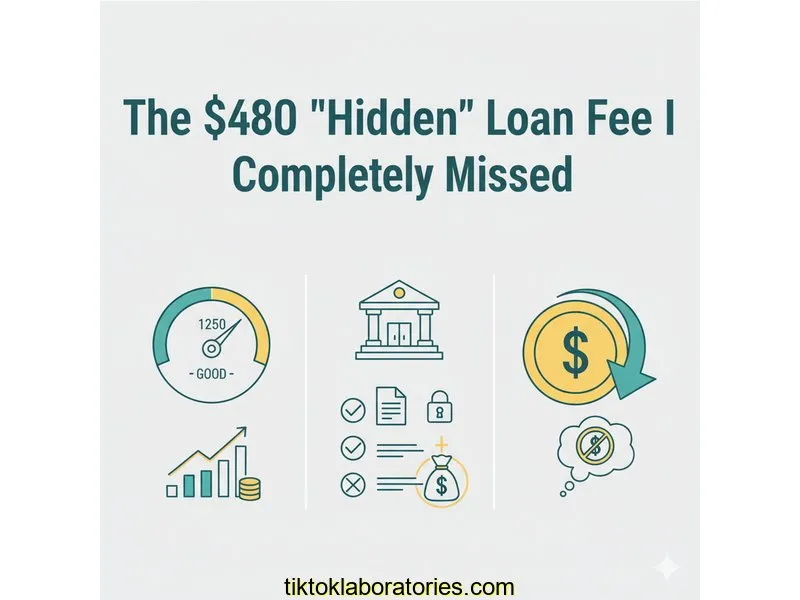
Auto Loan Calculator
Calculate payments over the life of your Loan
Home Blog Privacy Terms About Contact
Calculate payments over the life of your Loan
Home Blog Privacy Terms About ContactPublished on October 12, 2025

It started with a feeling I can only describe as financial vertigo. I was juggling three different debt payments every month: two high-interest credit cards and a lingering balance from a furniture store financing plan. The total was right around $12,000, and the mental load of tracking different due dates, minimum payments, and soaring interest rates was becoming unbearable. My stomach would twist into a knot every time I opened my banking app.
I saw ads for personal loans everywhere, promising a single, simple monthly payment and a clear path out of debt. It felt like a lifeline. "This is it," I thought. "This is how I get organized and finally get ahead." How hard could it be? You find a lender, apply online, and get the money. Simple, right?
My initial confidence was sky-high. I had a decent credit score, a steady job, and a clear purpose for the loan. I spent an evening researching online lenders and found one with a slick website and glowing testimonials. They advertised a competitive interest rate of 11.99% and an easy application process. I was sold. The thought of collapsing all that stressful debt into one predictable payment of around $316 a month felt like a dream. It was a wave of relief washing over my anxiety.
But in my rush for that relief, I made a critical error. I focused entirely on the interest rate and the monthly payment, the two big, shiny numbers they put right at the top. I skimmed the rest, assuming the details were just standard boilerplate. This assumption, born from a desire for a quick fix, was about to cost me dearly. This is my personal experience, a story of what I overlooked, and a lesson I learned the hard way. I'm not a financial advisor, and this is not financial advice, but simply an honest account of my journey.

The application process was exactly as simple as advertised. I uploaded my documents, got approved within 24 hours, and was presented with the final loan agreement. I felt a surge of accomplishment. I was taking control of my finances! I scrolled through the digital document, my eyes scanning for the key numbers: $12,000 loan amount, 11.99% interest rate, 48-month term. It all looked correct.
I digitally signed the agreement and waited for the funds to be deposited into my account, which they said would take about two business days. I had a list ready: pay off Card A, pay off Card B, clear the furniture balance. I could almost taste the freedom. The email confirming the fund transfer arrived right on schedule. I eagerly logged into my bank account, ready to see the full $12,000 and start slaying my debt dragons.
And that’s when my heart sank right into my shoes. The deposit amount wasn't $12,000. It was $11,520. A wave of confusion, then panic, washed over me. Was it a mistake? Did they only approve me for a lower amount? I frantically reopened the confirmation email, but it clearly stated the loan was for $12,000. My mind raced through the possibilities, none of them good.
I pulled up the 20-page PDF of the loan agreement I had so quickly signed. This time, I didn't skim. I read every single line, my eyes straining. And there it was, buried on page three in a dense paragraph under a sub-heading titled "Loan Costs." It was a single sentence: "Your loan is subject to a one-time, non-refundable origination fee of 4%, which will be deducted from your loan proceeds prior to disbursement." Four percent. That was the missing $480.
I had been so focused on their marketing claim of "no application fees" that I completely missed the much more significant "origination fee." The feeling was awful—a mix of foolishness and frustration. I had borrowed $12,000, was going to pay interest on the full $12,000, but had only received $11,520 to actually work with. That simple oversight cost me $480 before I had even made my first payment.
That initial shock quickly turned into a mission. I felt foolish, yes, but I was determined to never let it happen again. I spent the next week educating myself, not just about origination fees, but about the entire language of lending that I had previously ignored. I dove into articles and videos explaining the difference between a nominal interest rate and the Annual Percentage Rate (APR), which is the number that actually includes fees and gives you a truer picture of the cost of borrowing.
It was a crash course in personal finance, fueled by the sting of my own mistake. I realized that comparing loans based on interest rates alone is like comparing cars based only on their color. It’s an important factor, but it doesn't tell you anything about what's under the hood or the true cost of ownership. The APR was the number I should have been focused on all along. In my experience, understanding this distinction was the key that unlocked everything.
I couldn't undo the loan I had accepted, but I could create a better process for the future. This is what I developed for myself, a personal checklist to ensure I never miss a critical detail again. Your own process might look different, but this is what gives me peace of mind now.
Before I even consider the interest rate, I find the APR. This has become my primary comparison number because, by law, it has to include most fees. It gives me a more honest, apples-to-apples way to compare different loan offers.
I no longer wait to see if fees are mentioned. I proactively look for them. I now use the "Ctrl+F" search function on any digital document to look for keywords like "fee," "origination," "penalty," and "charge." I want to know about every potential cost upfront.
I found several online loan calculators that allow you to input not just the loan amount and interest rate, but also the origination fee percentage. This shows me exactly how much money I'll receive and calculates the total cost of the loan over its entire term. It's a powerful reality check.
My biggest mistake was rushing because I was desperate for a solution. Now, I impose a mandatory 24-hour waiting period on myself after receiving any financial offer. This gives me time to review the documents without the pressure of emotion and excitement clouding my judgment.
By accepting that loan, I was stuck with the terms for the 48-month duration. However, the education I gained from that $480 mistake was priceless. I later ran the numbers on another offer I had initially ignored—one with a slightly higher interest rate of 12.5% but only a 1% origination fee. It turned out, over the life of the loan, that offer would have been cheaper. The true victory wasn't in saving money this time, but in gaining the knowledge and confidence to make much smarter decisions going forward. That feeling was a different, more profound kind of relief.
Looking back, that frustrating experience was one of the most valuable financial lessons of my life. It forced me to move from being a passive consumer to an active, informed participant in my own finances. Here are the biggest lessons I personally took away from the ordeal. Remember, this is what I learned; your situation and takeaways may be entirely different.
After sharing my story with friends, I get asked a lot of the same questions. Here are my personal thoughts on them, based entirely on my own journey. This is not professional advice, just my perspective.
Looking back, I could have spotted it on the "Loan Facts" disclosure sheet that came with the offer, even before the final agreement. I was so focused on the approval that I just glanced at it. The fee was listed there, but it wasn't bold or highlighted. My lesson was to slow down and treat every document in the process as critical information.
What I learned is that it's not automatically a bad deal, but it requires more math. A loan with a low interest rate and a high fee could still be more expensive than a loan with a slightly higher rate and no fee. The only way I found to know for sure was to use the APR for comparison or to calculate the total cost (principal + interest + fees) for each offer I was considering.
For me, the interest rate is the cost of borrowing the money. The APR is the cost of getting the loan. The APR includes the interest rate plus most of the fees, giving me a much more complete picture. I now see the interest rate as just one piece of the puzzle, not the whole thing.
If I were to do it all over again, I would get pre-qualified with at least three different lenders. Then, I'd create a simple spreadsheet comparing not just their advertised rates, but their full fee structures and calculated APRs. I would have let the math, not the marketing, make the decision for me. I wouldn't have rushed the decision just to feel a sense of immediate relief.
The single most important thing I learned from that $480 mistake is that in personal finance, the details are everything. The big, advertised numbers are designed to catch your eye, but the real story is often tucked away in the fine print. My haste to solve a stressful problem led me to overlook a crucial detail that cost me real money. It taught me that slowing down, asking direct questions, and reading everything is not a sign of doubt, but a sign of diligence.
My journey to consolidate my debt was ultimately successful, but it came with a tuition fee I wasn't expecting. I hope that by sharing my misstep, I can encourage others to be a little more meticulous. Navigating loans and debt can feel intimidating, but taking the time to truly understand the terms of any agreement is the most powerful thing you can do for your financial well-being.
I'm Alex, and this was my story. It’s a reminder that we can learn a great deal from our mistakes, especially when they have a dollar sign attached. Remember, this is just my personal story. Always consult with a qualified financial advisor for your specific situation.
Disclaimer: This article documents my personal experience with a loan application/process. This is not financial advice. Your own situation, creditworthiness, and loan options will differ. Always consult with a qualified financial advisor, review all loan documents carefully, and compare multiple lenders before making any financial decisions. Loan terms, rates, and fees vary by lender and borrower qualifications.
About the Author: Written by Alex, someone who has navigated personal loans, made mistakes, and learned from them over 8+ years of managing personal finances. I'm not a financial advisor or loan officer—just someone sharing personal experiences to help others avoid the mistakes I made. Always seek professional financial guidance for your specific situation.